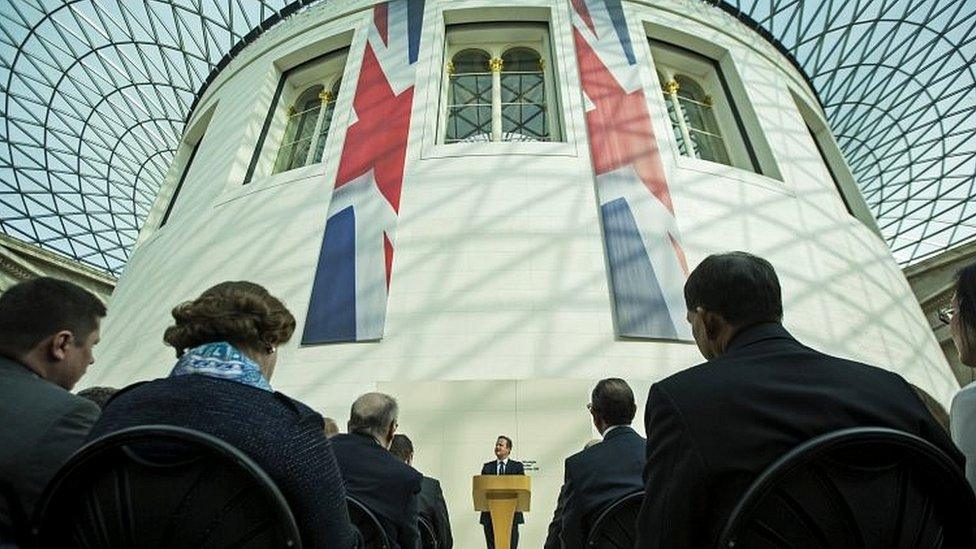EU referendum: War and peace
- Published

For the many, many voters who haven't yet paid much attention to the EU referendum campaign all of a sudden, along comes the prime minister warning leaving the EU might, in theory, lead us to war.
Listening now?
David Cameron didn't hold back this morning, in the magnificent venue of the British Museum, evoking memories of Churchill, Spitfires, and the war dead to give a sombre and certainly, his most serious warning yet about the risks of voting Out.
He didn't quite say if we go for the exit door on 23 June we'll be invaded overnight.
But the prime minister certainly went a lot further than any of the security experts who have carefully expressed concerns about the difficulties of maintaining relationships with our allies. He claimed in his "big, bold patriotic" case for staying in, that although Nato had a role too, if we leave the European Union, peace around the continent was at risk, telling me, "Can we know what would happen? No. But is it worth taking the risk? No."
Of course, during the course of political campaigns the claims being made on different sides become more and more well, shall we say, stretchy.
It is certainly true that many security experts have gone on the record warning against what might happen. And nearly all of our international allies think that staying in the European Union is a safer option. The number of diplomatic cars clogging up the narrow streets around the British Museum this morning in London's Bloomsbury was a sure sign of that.
But the prime minister's klaxon this morning?
'World War Three'
Remember less than three months ago he was still saying that he would be ready to lead us out of the EU if he didn't reform our relationship.
Unless you believe he would knowingly have risked plunging the country into a conflict, you'd be forgiven for at least sprinkling a little salt on his arguments this morning.
At a smaller, sweatier venue in Westminster, Vote Leave's big name was on the platform just hours later.
Boris Johnson sprung onto the stage, and in a long, and unusually serious speech, he argued that the PM's EU reforms had achieved nothing and that we're victims of a "systematic subterfuge" - the EU is a political project that's undermining our democracy he claimed, our independence is under sustained attack.
And of the PM 's claims that we'd be more likely to find Europe embroiled in conflict, he said Brexit "would not lead to World War Three".
Mr Johnson's speech might be remembered for more colourful moments - a snatch of him singing EU anthem Ode to Joy in German, his defence of "Liberal Cosmopolitans" - not a cocktail, but people like himself with a tolerant view of the world, an open outlook who can, he insisted, be in favour of leaving the EU.
Def Con One
But he couldn't have been clearer. Mr Johnson thinks the claim that leaving the EU would lead to war is what he might describe as piffle, and more to the point, he suggested that David Cameron doesn't really believe it either.
What does the first day of the short campaign tell us? (If it's not your thing, don't worry, there are only forty five days to go).
First, the debates won't all be about the economy. David Cameron switched focus today from the economic arguments to security and patriotism.
Second, very dramatic claims will be made by both sides. In the space of twenty four hours the government has claimed that house prices will fall and we might go to war.
Third, the fact those claims are already at Def Con One, suggests the Remain campaign is worried that the polls are uncomfortably close, and that Vote Leave has nothing to lose.
And lastly, it is already personal, oh so personal. Now, on the record, senior members of the same political party have called each other; irrelevant, cretinous, reckless, economically illiterate, preposterous... I need hardly go on.
And just for good measure, there was a joke from Mr Johnson this morning at George Osborne's expense, laughing that he'd been pleased to discover that he had principles after an interview yesterday.
This is about war and peace in the Conservative Party too. As each day goes on it's harder to see how they will be able to call a truce after the vote.
- Published9 May 2016
- Published9 May 2016